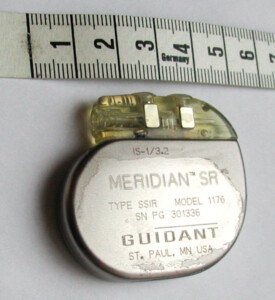
If a person has recently had a pacemaker implant, but is also suffering from blackouts or fainting spells, one may wonder if the vagal nerve is somehow getting adversely affected by the pacemaker.
Pacemakers Are Close to the Vagal Nerve
“Pacemakers do not damage vagal nerves,” says David N. Smith, MD, a board certified cardiologist with Premier Cardiovascular Care and Wellness in SC.
He continues: “The question may refer to a phenomenon where the pacemaker implantation process stimulates the vagal nerve to cause hiccups.
“There still would be no damage to the nerve itself. If the pacemaker insertion does stimulate the vagal nerve during implantation, this is more of a reflection of the pacemaker lead being close to the vagal nerve.
“There is no damage to the vagal nerve. The pacemaker lead can be repositioned to correct this.”
What Is a Pacemaker?
This little device has two parts: a generator and electrodes (leads).
It’s placed under the skin (a minor procedure) in the person’s chest where it will then help control, or pace, the heartbeat.
Usually a person needs a pacemaker due to an arrhythmia or abnormal heart rhythm.
If the heart beats too slowly, a pacemaker can set the programmed pace, such as 70 beats per minute.
A pacemaker may be implanted after a person has a heart attack or undergoes coronary bypass surgery.
The pacemaker can detect if the patient’s heartbeat is too slow.
It then sends an electrical signal to the heart to speed up the pulse.
Some people may fear the idea of something being put just under their skin that sends electrical signals to their heart.
But complications from the procedure are uncommon. They include the following:
• Infection at the site of implantation
• Allergic response to the anesthesia or dye that’s used during the implantation
• Bleeding or bruising at the generator site. This is more likely if the patient is on a blood thinner.
• Collapsed lung
• Damage to the blood vessels or nerves (which would include the vagal) near the pacemaker. This is very uncommon.

Dr. Smith is a published author, national lecturer and Yale-trained physician-scientist certified by the American Board of Internal Medicine in Cardiovascular Disease. From his basic science background combined with advanced clinical research training at the Columbia Mailman School of Public Health, he brings an integrated holistic approach to cardiovascular medicine.
 Lorra Garrick has been covering medical, fitness and cybersecurity topics for many years, having written thousands of articles for print magazines and websites, including as a ghostwriter. She’s also a former ACE-certified personal trainer.
Lorra Garrick has been covering medical, fitness and cybersecurity topics for many years, having written thousands of articles for print magazines and websites, including as a ghostwriter. She’s also a former ACE-certified personal trainer.
.


























